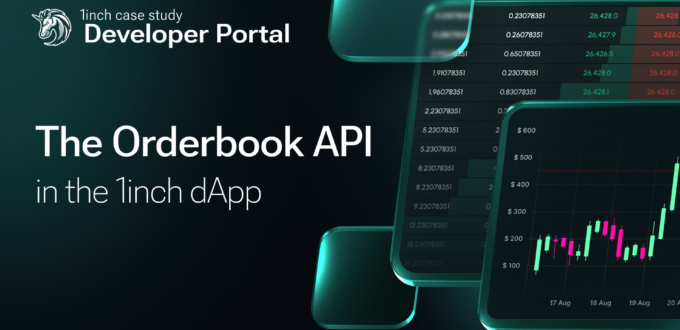The 1inch dApp uses the Orderbook API to offer users efficient limit order functionality.
1inch actively uses the tools provided to Web3 developers through the 1inch Developer Portal in its own products. Today, we’ll look into how the Orderbook API is used to deliver efficient limit order functionality within the 1inch dApp.
The Orderbook API, powered by the 1inch Limit Order Protocol, was integrated into the 1inch dApp to power its limit order functionality. The API offers a number of notable benefits for both users and developers.
Benefits for users
For users, one key advantage is the ability to place limit orders that remain active until market conditions meet the specified price, allowing them to set their desired rates and wait for favorable market movements. This flexibility is particularly valuable, as orders can remain valid for extended periods – from hours to months – increasing strategic possibilities.
Additionally, limit orders are resistant to maximal extractable value (MEV) attacks, since users receive the exact amount of tokens requested. This effectively enables ‘transactions without slippage,’ as execution strictly follows the user’s specified terms, providing greater security and reliability.
During the entire lifespan of a limit order, the funds are not locked. Users can transfer them to another wallet or reduce the allowance granted to the limit order smart contract. There’s no need for concern, as all relevant information is easily accessible through the Orderbook API.
One of the key features of the 1inch Limit Order Protocol is its support for Permit (EIP-2612) and Permit2. This allows users to place orders without the need to hold native tokens, such as ETH, BNB, MATIC, etc., in their wallet for transaction fees. The Limit Order API accepts permit data as part of the order, which is then executed on-chain at a later time.
Benefits for developers
From a developer’s perspective, the Orderbook API offers a range of powerful features. It enables the viewing of limit orders for specific users or the entire orderbook, along with access to all validity statuses. This comprehensive order monitoring and management capability can be applied across various applications, unlocking new opportunities for liquidity provision and arbitrage.
Another key advantage is the API’s multi-chain support. Compatible with 12 blockchains, including Ethereum, BNB Chain, Polygon, Avalanche and Fantom, it allows for the deployment and interaction with limit orders across multiple ecosystems.
The integration of the Orderbook API can extend these benefits to various projects in the crypto sector, whether they are wallets, exchanges or arbitrage/trading bots. For these projects, the API offers even more gas-efficient RFQ limit orders, enhancing overall efficiency.
If you have questions about possible integration of the Orderbook API or any other 1inch API into your project, please, reach out to our business development team.
Build Web3 with the tools available on the 1inch Developer Portal!
